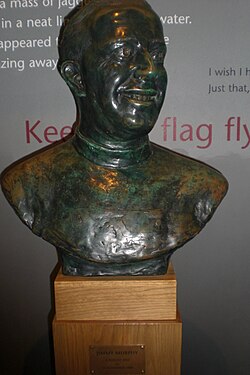Jimmy Murphy (footballer)
 |
|||
| Personal information | |||
|---|---|---|---|
| Full name | James Patrick Murphy | ||
| Date of birth | 8 August 1910 | ||
| Place of birth | Pentre, Rhondda, Wales | ||
| Date of death | 14 November 1989 (aged 79) | ||
| Place of death | Manchester, England | ||
| Playing position | Wing half | ||
| Senior career* | |||
| Years | Team | Apps | (Gls) |
| 1928–1939 | West Bromwich Albion | 204 | (0) |
| 1939 | Swindon Town | 4 | (0) |
| National team | |||
| 1933–1938 | Wales | 15 | (0) |
| Teams managed | |||
| 1956–1964 | Wales | ||
| 1958 | Manchester United (caretaker) | ||
| * Senior club appearances and goals counted for the domestic league only. |
|||
James Patrick "Jimmy" Murphy (8 August 1910 – 14 November 1989) was a football player who made over 200 appearances for West Bromwich Albion and won 15 caps for Wales. He later became manager of the Welsh national team. Murphy is most famous for being a strong, influential figure at Manchester United from 1946 until the 1970s, as assistant manager, chief coach, reserve team manager and a full-time scout, although he disliked the limelight and preferred to work quietly behind the scenes. Following the Munich air disaster on 6 February 1958, Murphy temporarily took over as Manchester United manager until the end of the 1957–58 season, steering the club through its greatest crisis. Murphy had not been on the Munich aeroplane, as he had missed the trip due to managing Wales against Israel in Cardiff on the same night as the Red Star Belgrade versus Manchester United match in Belgrade, Yugoslavia. The victory for Wales over Israel that night ensured that Wales qualified for the 1958 FIFA World Cup in Sweden.
Born in Ton Pentre, Rhondda, Murphy attended Ton Pentre Village School and as a boy played the church organ. As a youth he played football for Ton Pentre Boys, Treorchy Thursday F.C., Treorchy Juniors and Mid-Rhondda Boys and in 1924 represented Wales in a schoolboy international against England in Cardiff. He turned professional in February 1928 when he joined West Bromwich Albion as a 17-year-old.
...
Wikipedia
